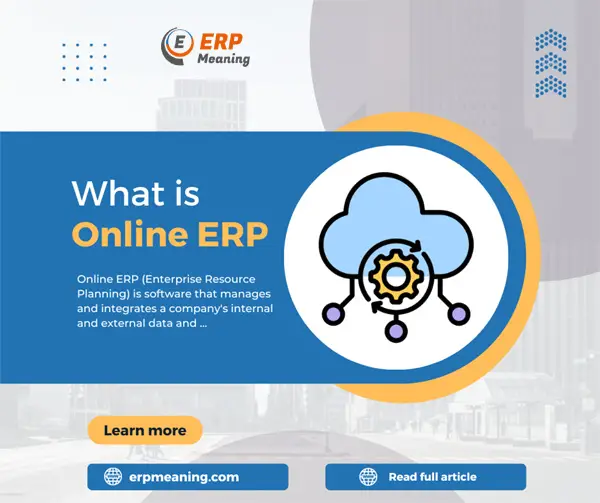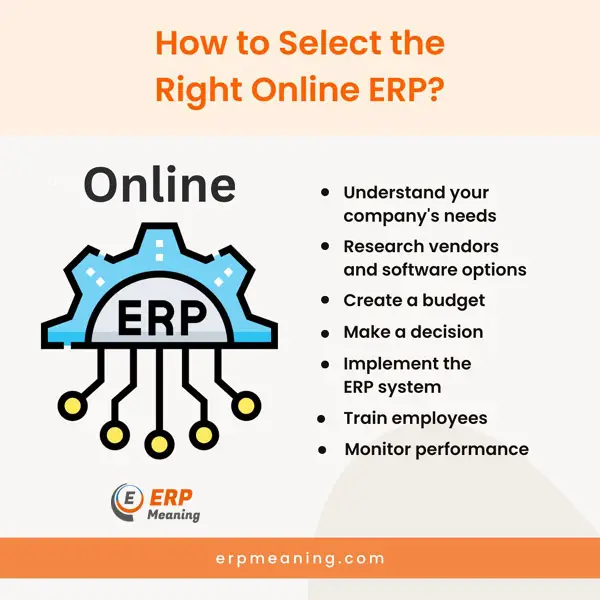In today’s digital age, staying on top of your business operations is essential. Many companies are turning to online ERP software for better visibility and control. This blog explains what Online ERP is, how it works, its benefits and components, along with the differences between this type of system and on-premises ERP. We’ll also discuss common challenges of online ERP, how to select the right system pricing, and why it might be the best option for your business.

What Is Online ERP?
Online ERP (Enterprise Resource Planning) is software that manages and integrates a company’s internal and external data. The software lets businesses store information in one central database, allowing multiple departments and functions to access the same data. This helps reduce errors and improve collaboration among teams. Online ERP is also known as cloud ERP.
By switching to online ERP software, you gain access to the same—if not better—functionality as on-premises systems without being burdened by high licensing fees. That way, your sales team always has accurate inventory information, and your finance team can focus on more important things like cash flow and audits.
How Does Online ERP Software Work?
Online ERP systems work by connecting a variety of technologies using high-speed internet networks. These systems are always online, and the provider handles security updates. This means that all your team has to worry about is logging in and using the system itself. Newer ERP systems online may be less expensive to maintain than older ERP systems hosted on company servers.
Online ERPs are available on desktop computers and mobile devices, providing a wide variety of business applications. These apps keep your company running efficiently by delivering positive customer experiences and profitable outcomes.
With an online ERP, you and your team can access any information you need from anywhere in the world, whether that’s customer sales meetings, remote worksites, or your home office. The ability to securely log in from anywhere is essential in the post-COVID business environment, where more workers are working remotely than ever.
Benefits of Online ERP
Online ERP can be advantageous to on-premises ERP because the provider handles maintenance and updates and has built-in guarantees for availability and data security. In addition, it usually has a lower total cost of ownership since subscription fees per user are often less expensive than traditional licensing software— especially as your company grows.
Thanks to the internet, it’s now easier to connect with outside suppliers, partners and customers- ERP systems make this possible. With increased collaboration in processes like sales forecasting, supply chain management, and talent acquisition, businesses are achieving more than they ever thought possible.
Online ERP vendors have improved the user experience (UX) more than on-premises ERP because they can take advantage of new technologies, such as tiled GUIs and voice user interfaces. Also, accessing online ERPs from smartphones is easier than from on-premises systems.
Components of Online ERP System
Depending on your business’ industry and specific needs, you can choose from various modules to supplement all Online ERP software’s core financial and accounting functions. Examples of available cloud ERP modules include:
- Human Resources
- Project Management
- Supply Chain Management
- Customer Relationship Management (CRM)
- Warehouse Inventory Management
- Reporting and Business Intelligence
- E-Commerce Integrations
- Business Process Automation
Online ERP vs. On-Premises ERP
When deciding between an online and on-premises ERP system, it’s important to consider the needs of your business.
The IT department of a business or a managed service provider instals and maintains on-premises ERP software. Enterprise-grade servers, networking, and storage are purchased or leased in advance by the company in order to physically run and house the software and related data. ERP systems housed on business premises come with increased costs for things such as upkeep, fixes, supplementary software, and ERP customizations. You’ll also need to budget for security software and backups of your storage and servers.
In contrast, Online ERP is managed by the vendor and hosted in the cloud. This “as-a-service” model provides software with regular security updates and feature upgrades. The vendor takes responsibility for the application, data storage, servers, operating system, physical data center infrastructure, and more.
Challenges of Online ERP Software
Although Online ERP has several advantages, it also causes some management issues. When the software is not on-site, administrators have much less control. Online ERP (Cloud ERP) can be more customized than On-premises ERP by adjusting configurations and settings or installing extensions. SaaS ERP systems, in particular, can take a lot of training and effort to get employees used to new business processes and workflows.
In addition to adapting to the security provided by the cloud ERP provider, which likely differs from on-premises ERP, companies must also consider different countries’ data residency requirements. They must follow all local privacy and security regulations if their ERP data is stored in multiple places.
As companies rapidly expand, they may find that subscription fees for online ERP (Cloud ERP) eventually surpass license costs for on-premises software. Therefore, individuals responsible for choosing an ERP system must be diligent in their research of common SaaS subscription models and detailed plans from various vendors.
Online ERP Pricing
The total expense of an ERP system depends on which one you select. However, choosing between systems is tricky because pricing is subjective and considers numerous diverse factors. To validate the cost of an ERP investment, you should look at the ROI (return on investment) in addition to its base price.
The most clear-cut system and implementation costs are:
- Upfront software costs
- Subscription fees
- Employee training and development
- Customization and integration expenses
- Additional hardware and software costs
- Hosting charges
- Data migration and conversion fees
- Maintenance, support, and “perpetual license” fees
ERP systems vary in price, and companies should remember to account for this when comparison shopping. They should also beware of any hidden costs that might not be immediately apparent. Make sure to research pricing before selecting an online ERP system.

How to Select the Right Online ERP?
You will need to consider various elements before choosing an ERP system, and you can split up this process into several steps.
1. Understand your company’s needs: Outline the goals, objectives, and processes you want to automate or improve with an ERP system.
2. Research vendors and software options: Compare different ERP solutions to find one that meets your business needs.
3. Create a budget: Estimate the total cost of implementation and use.
4. Make a decision: Select one system that fits your budget, business model, and operational needs.
5. Implement the ERP system: Work with the vendor to set up and customize the system for your company’s operations.
6. Train employees: Train staff on how to use the new system as efficiently as possible.
7. Monitor performance: Track your organization’s progress and success with the ERP system.
Why choose a Cloud ERP?
In the digital age, cloud ERP systems are essential for any organization that wants to be successful. These powerful tools have many features and options that make them highly flexible, allowing businesses to boost productivity and gain valuable insights. With everything going digital, the world – and the competition – has changed. On-premise ERP systems can’t adapt to these changes very well because they were designed for a simpler time. They lack the speed, flexibility, and insight that companies need now to operate efficiently.
Customers today demand more from businesses, such as faster product delivery, nonstop service enhancements, increased reliability, and reduced costs. As a result, companies often need to look outside their walls for the best value possible. They collaborate online with many partners – for example, those involved in the production, sales management, product distribution, and service. Therefore, they require software that assists them with more complex internal processes but also helps manage global business networks. This can only be done by using an ERP system.
FAQ
Why is Online ERP better?
Online ERP systems offer many advantages over traditional on-premise ERP systems. They are more flexible, easier to use, deployable, and cost-effective. They also provide businesses with better security and allow collaboration between multiple teams.
How many companies use Online ERP?
A recent survey discovered that out of all the companies sampled, 21% use online ERP (Cloud ERP) systems. That’s nearly one in every five corporations! 15% host their SaaS on-premises, while the remaining majority prefer online services.
What is the right time to switch to Cloud ERP?
When your company is prepared to take the next step in its growth, switching to a cloud ERP (Cloud ERP) system is the best course of action. This could mean that you need more features or better scalability than your current solution. It also depends on whether you are happy with the performance of your existing ERP system and if switching would be beneficial in the long run. Lastly, make sure to do your research and find the best cloud ERP system for your business needs.
Is Online ERP Software secure?
Yes, online ERP software is very secure. Most vendors have invested heavily in the security of their systems and use state-of-the-art encryption methods to protect your data. Many cloud ERP systems offer additional authentication measures, such as two-factor authentication or biometric access. This guarantees that the system can only be accessed by authorised users. It is important to ensure you select a reputable vendor and ask about their security measures before implementing the system.
Conclusion
Online ERP can be a great choice for businesses looking to increase efficiency and optimize their operations. It provides the flexibility, scalability, and security needed to manage complex processes in today’s digital world. With its wide range of features and functions, an online ERP system has the potential to help businesses gain valuable insights into their operations and make more informed decisions. If you do your research and select the best system for your company’s needs, you’ll be well on your way to success.
